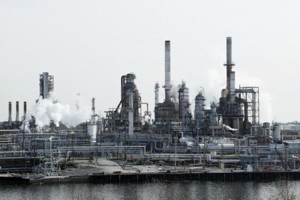Lured by discounts, US East Coast refiners snatch up Brazilian crude
NEW YORK/HOUSTON (Reuters) -- US East Coast refiners are on a Brazilian crude buying spree, market sources say, displacing West African cargoes as producers such as Royal Dutch Shell and Norway's Statoil sell rising output from fields off Brazil's coast.
The uptick in Brazilian imports into the region comes as the only Latin America producer to increase output in recent years seeks markets close to home for the oil it is pumping from the massive offshore subsalt oilfields under development.
February deliveries of Brazilian crude into the US East Coast are expected to hit 2.4 million barrels, or 86,000 bpd, the highest monthly volume since at least 2009, according to the US Energy Information Administration and Reuters shipping data.
The strong February numbers follow a surge in Brazilian oil shipments into the region that started last September that pushed the annual figure for all of 2016 past 2012 volumes.
"It's cheaper than West African crude," said one East Coast trader, when asked why the volume was rising.
The grades of crude being shipped include Iracema, Lula, Peregrino and Sapinhoa.
Brazilian medium grades compete with some African crudes, especially those from Angola.
China has been taking more Angolan crude over the past year, gobbling up almost all the medium and heavy crude West Africa has to offer in recent months.
Brazilian crude was once a mainstay on the US East Coast, averaging roughly 50,000 bpd in 2009, on the eve of the shale revolution that upended trade routes. US Bakken crude pushed out foreign imports on the East Coast from 2010 until 2015, but the reliance on domestic supplies proved short-lived.
Some grades are shipped from Uruguayan waters, others from the new Acu terminal at northeast of Rio de Janeiro.
"Prices for Lula, Sapinhoa and Iracema are currently at around the same level: Dated Brent -$1.50 per barrel for February delivery going out from Uruguay coast," said a trader.
Brazil's offshore crudes require a costly transportation method including dynamic positioning vessels capable of loading at floating platforms.
Most companies operating offshore fields in Brazil ship their barrels in two tranches, which increases freight costs, meaning shippers prefer to sell via relatively short trade routes to North American and European destinations.
Consortia formed by Brazil's state-run Petrobras, Shell, Statoil, Portuguese Galp Energia, China's Sinopec and Sinochem and Spanish Repsol are marketing Brazilian grades while increasing output at Santos and Campos basins.
Brazilian crudes remain strong on along the Gulf Coast, averaging roughly 125,000 bpd over the past two years, according to EIA data.
The biggest buyers on the US East Coast are PBF Energy and Philadelphia Energy Solutions, according to market sources and Reuters shipping data. Monroe Energy, a subsidiary of Delta Airlines, bought two cargoes in October, but has not made any additional purchases, according to a source familiar with the details.
Reporting by Jarrett Renshaw in New York and Marianna Parraga in Houston; Libby George contributed to this report from London; Editing by Simon Webb and Bernard Orr







Comments